Thomas James Richards, Diaries, Transcript Vol. 2 - Part 1
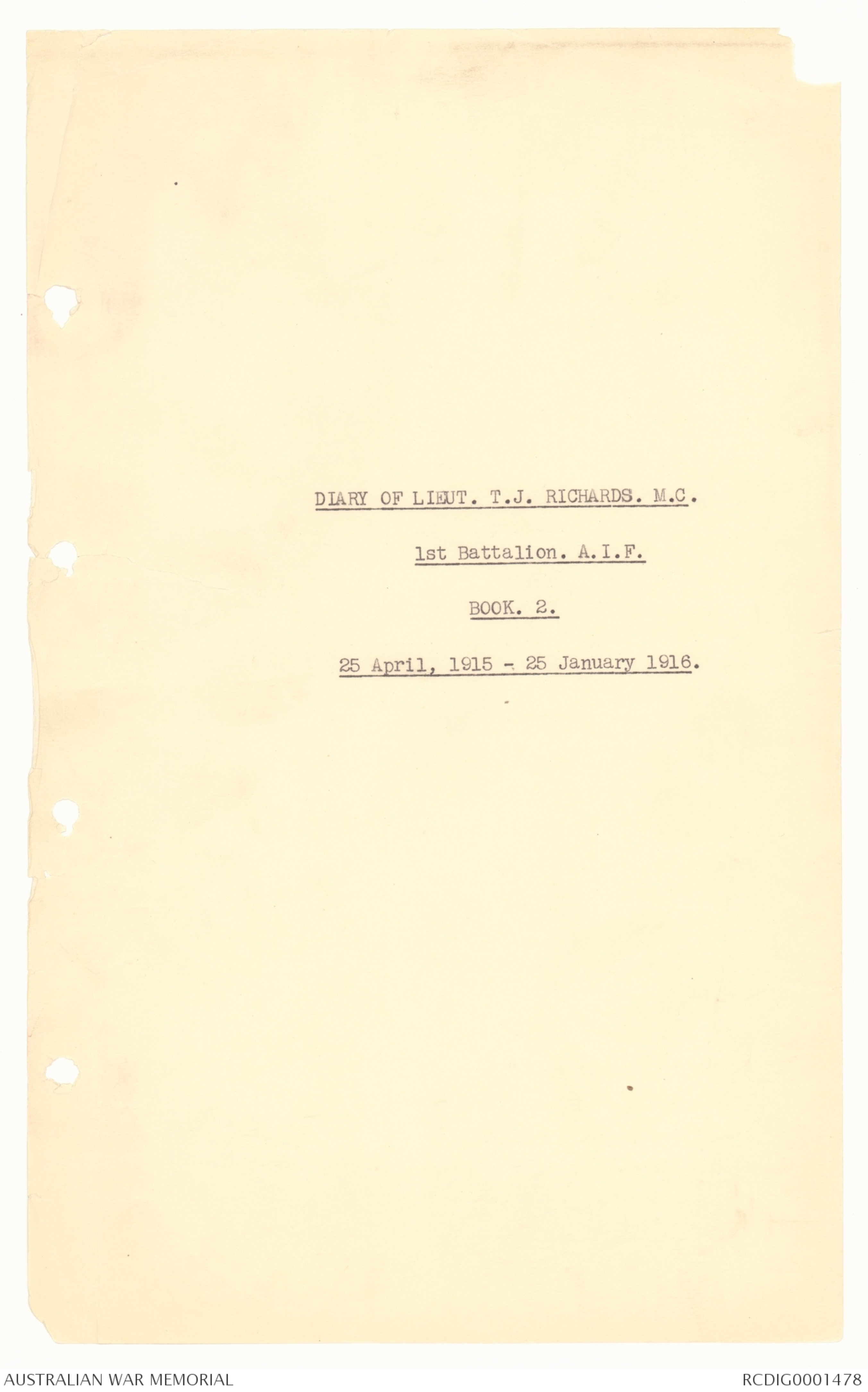
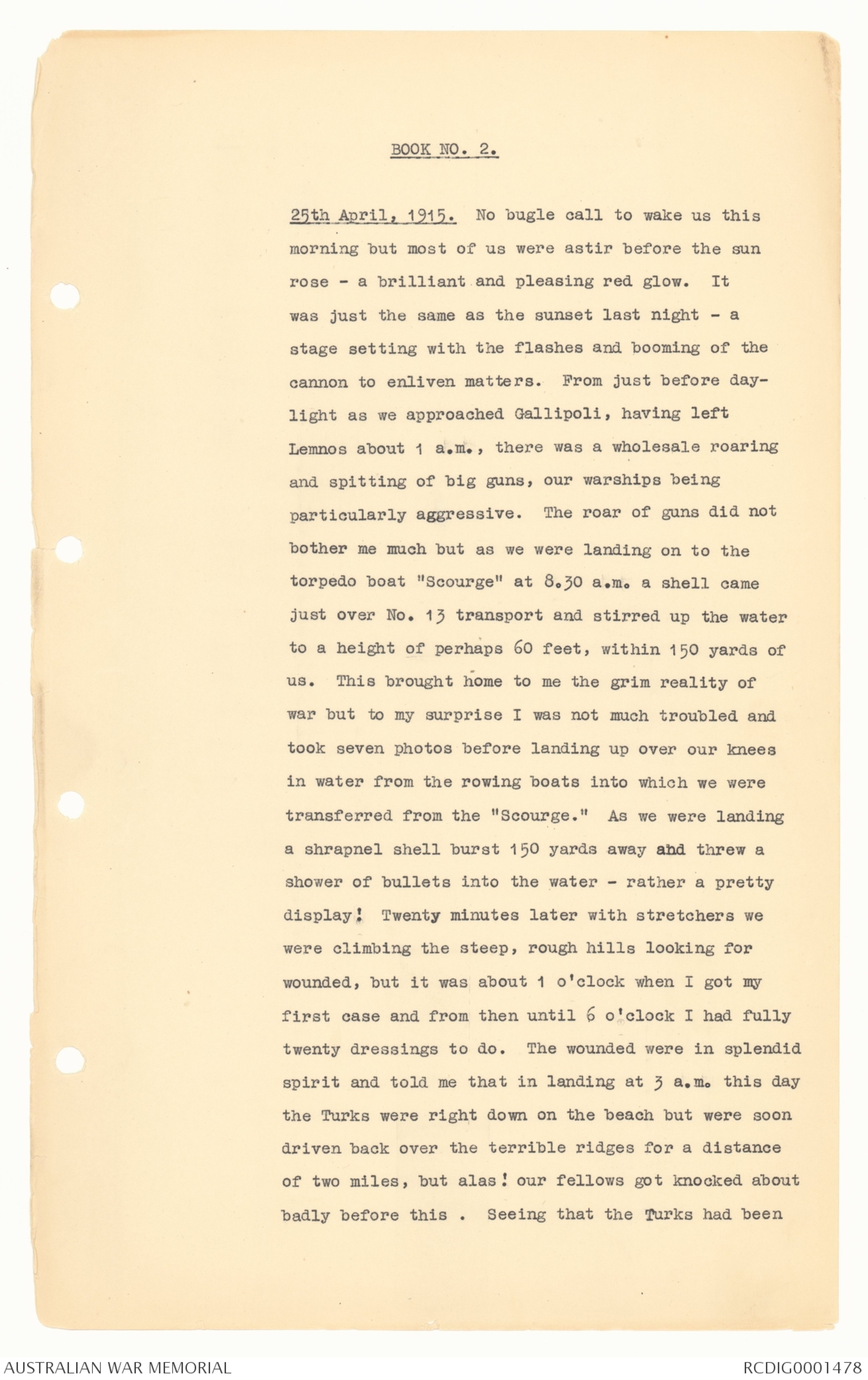
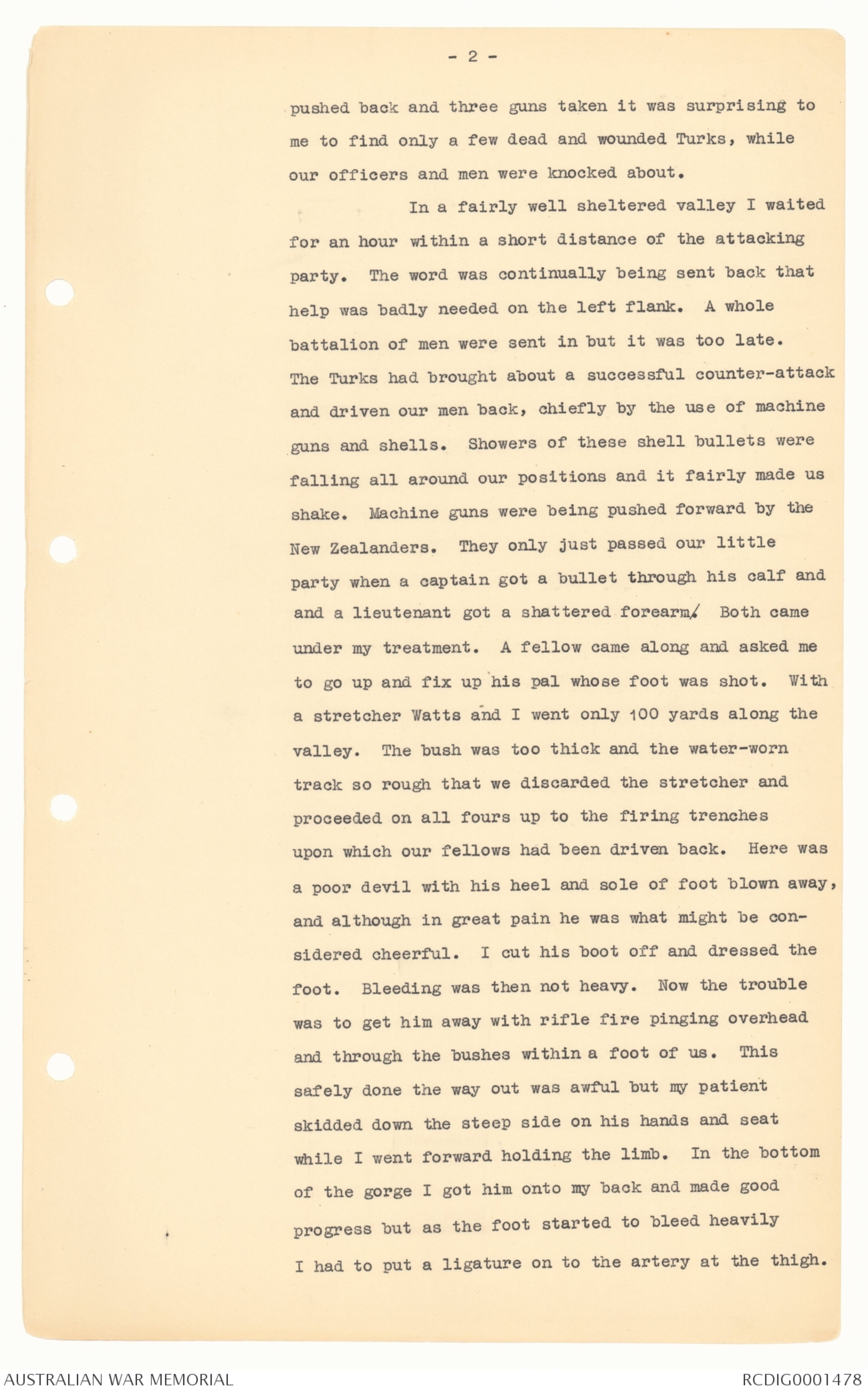
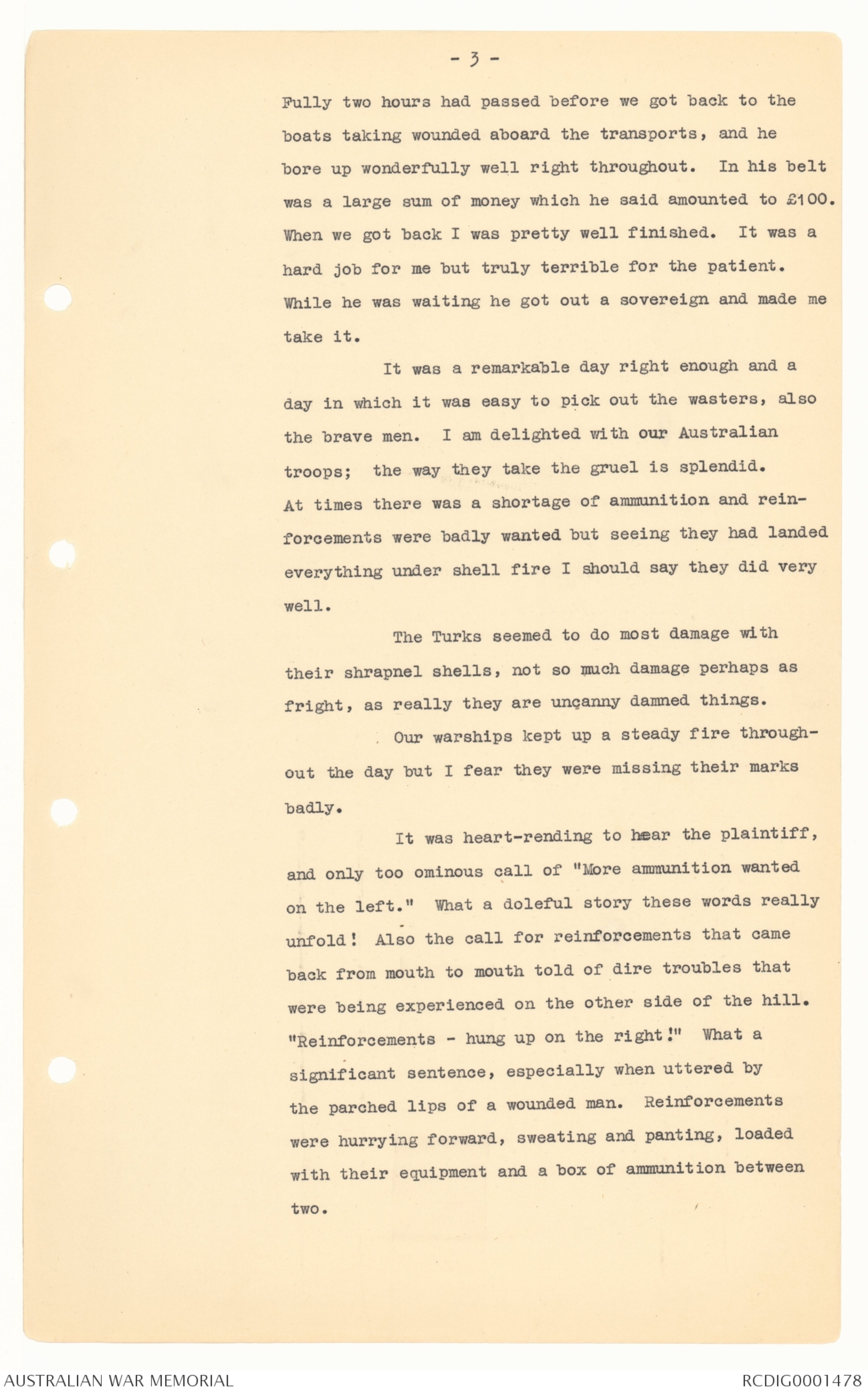
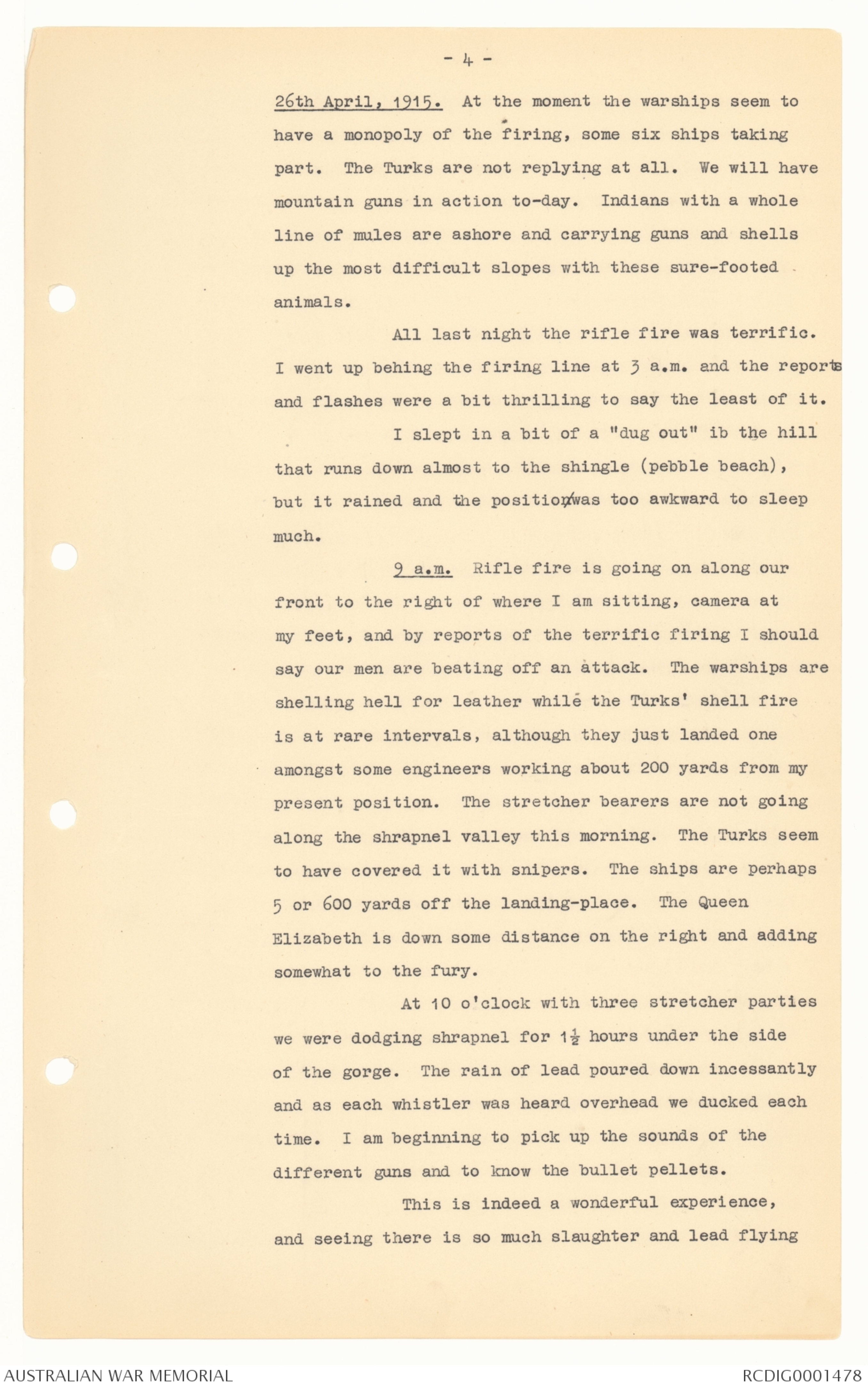
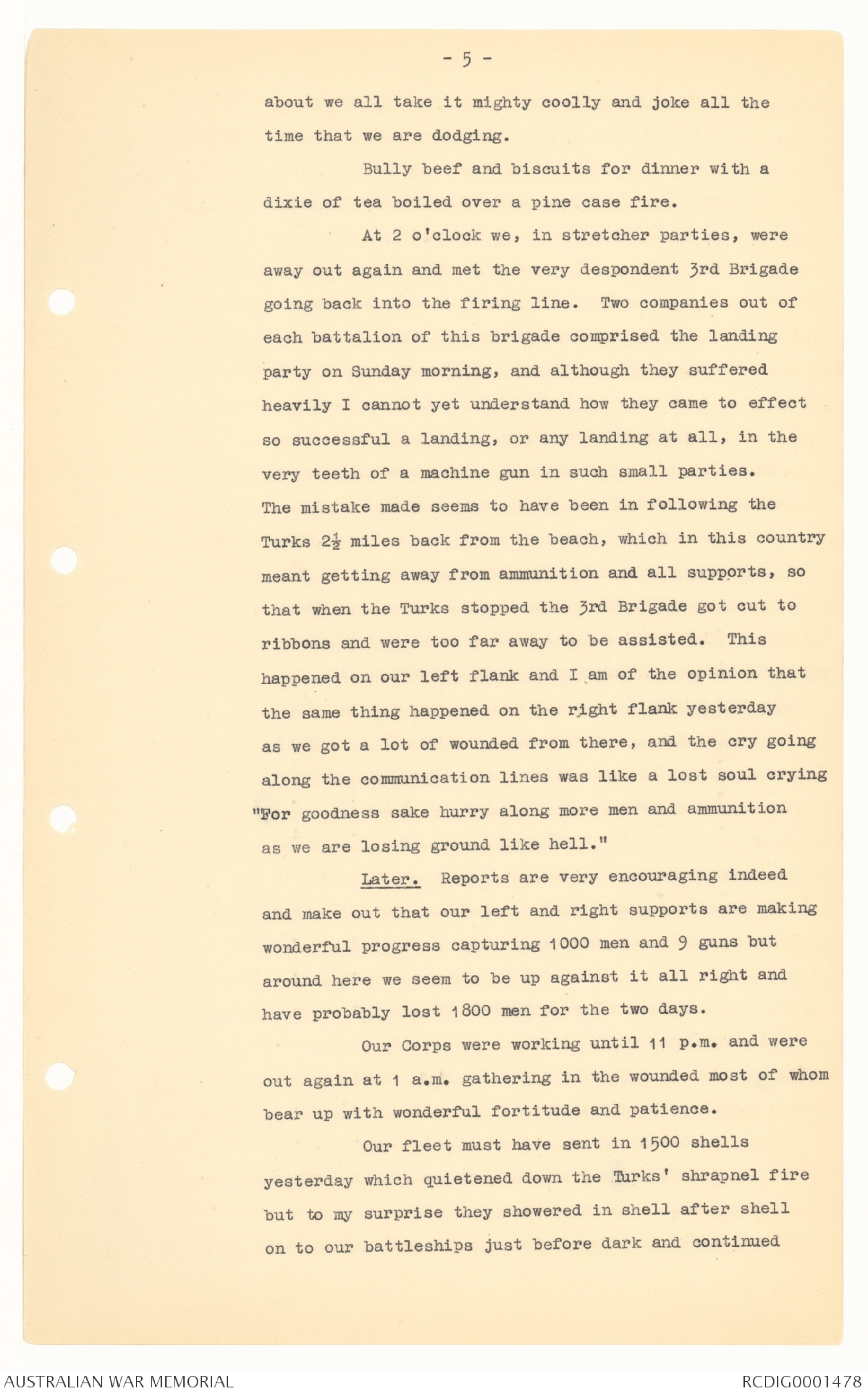
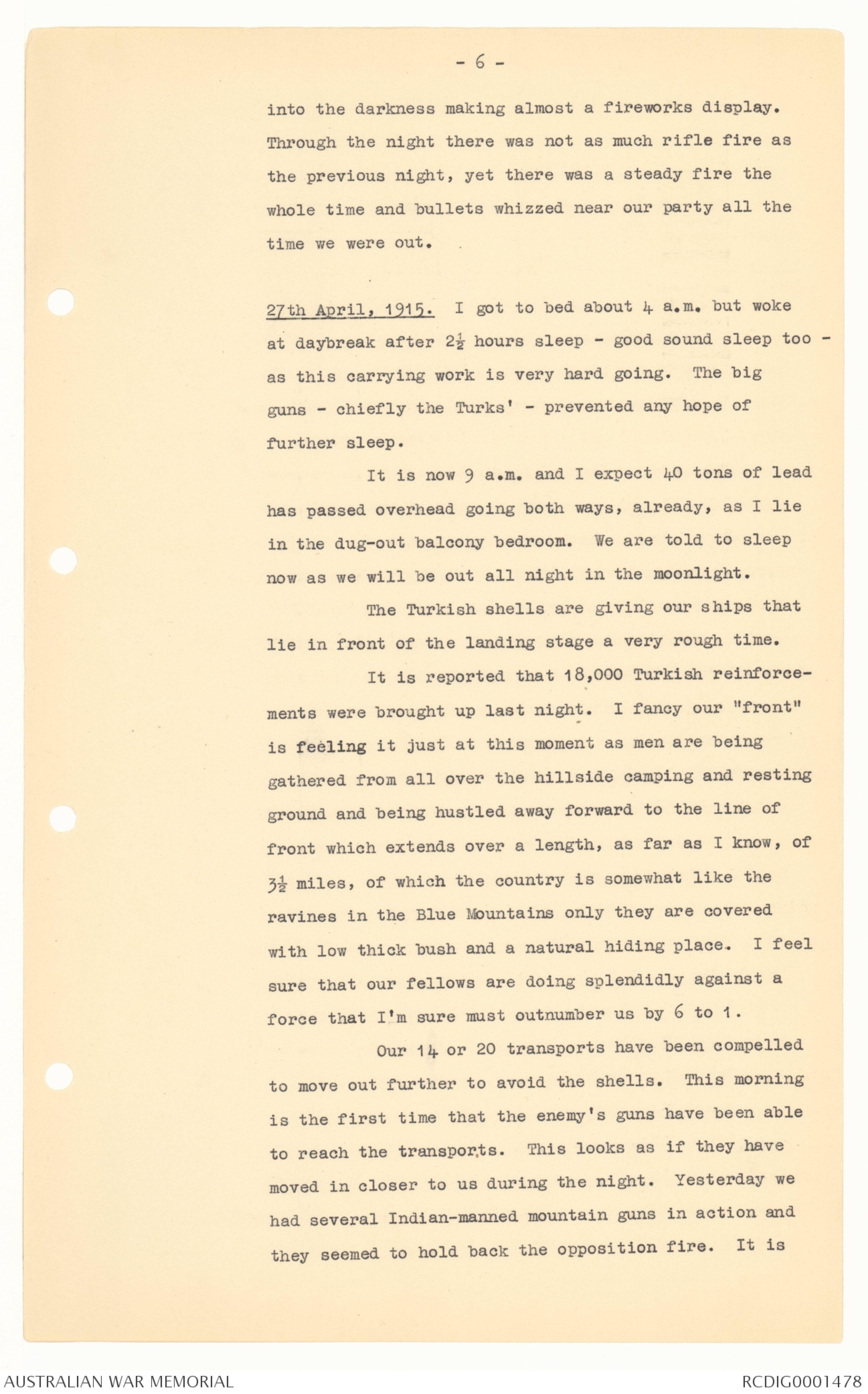
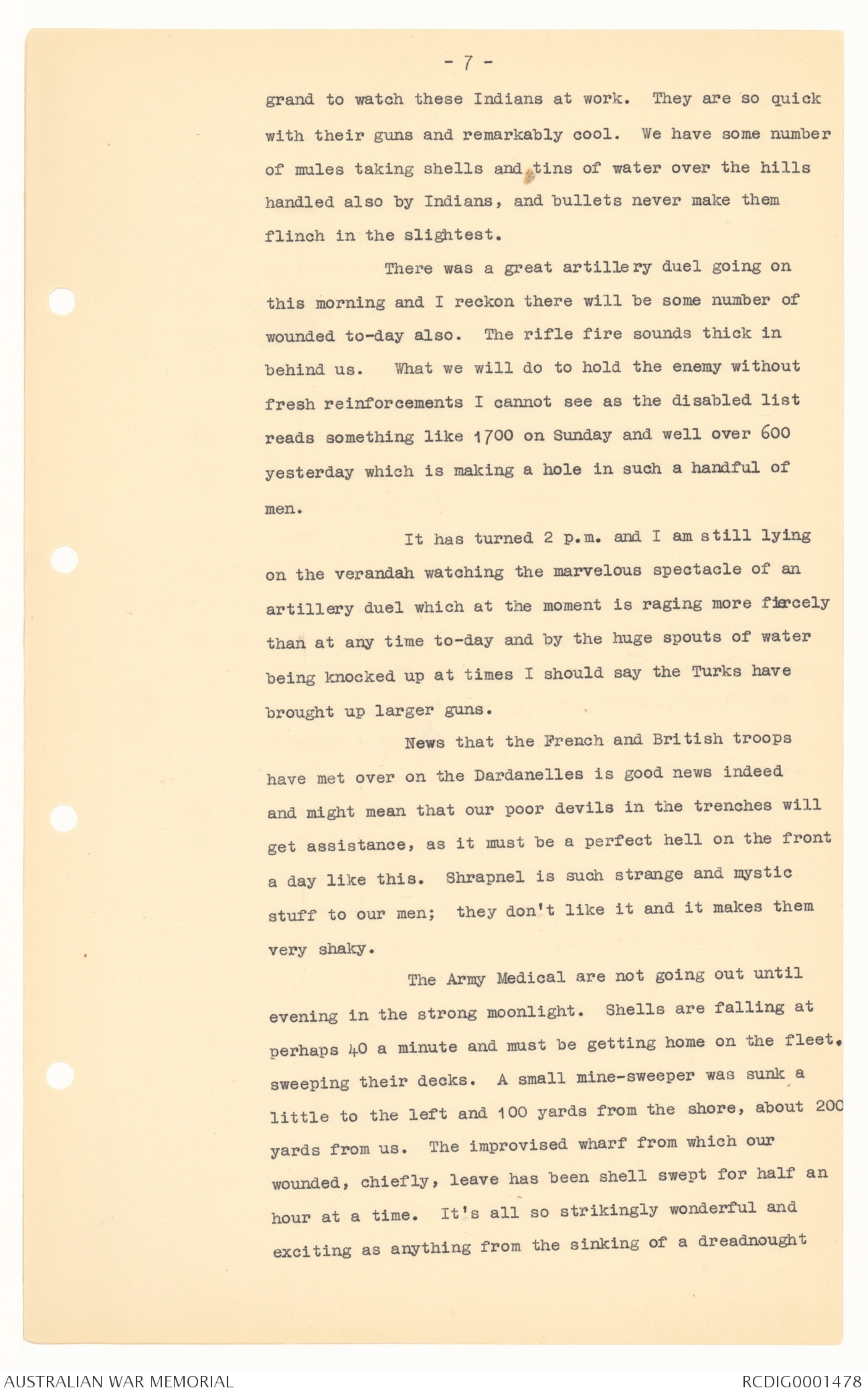
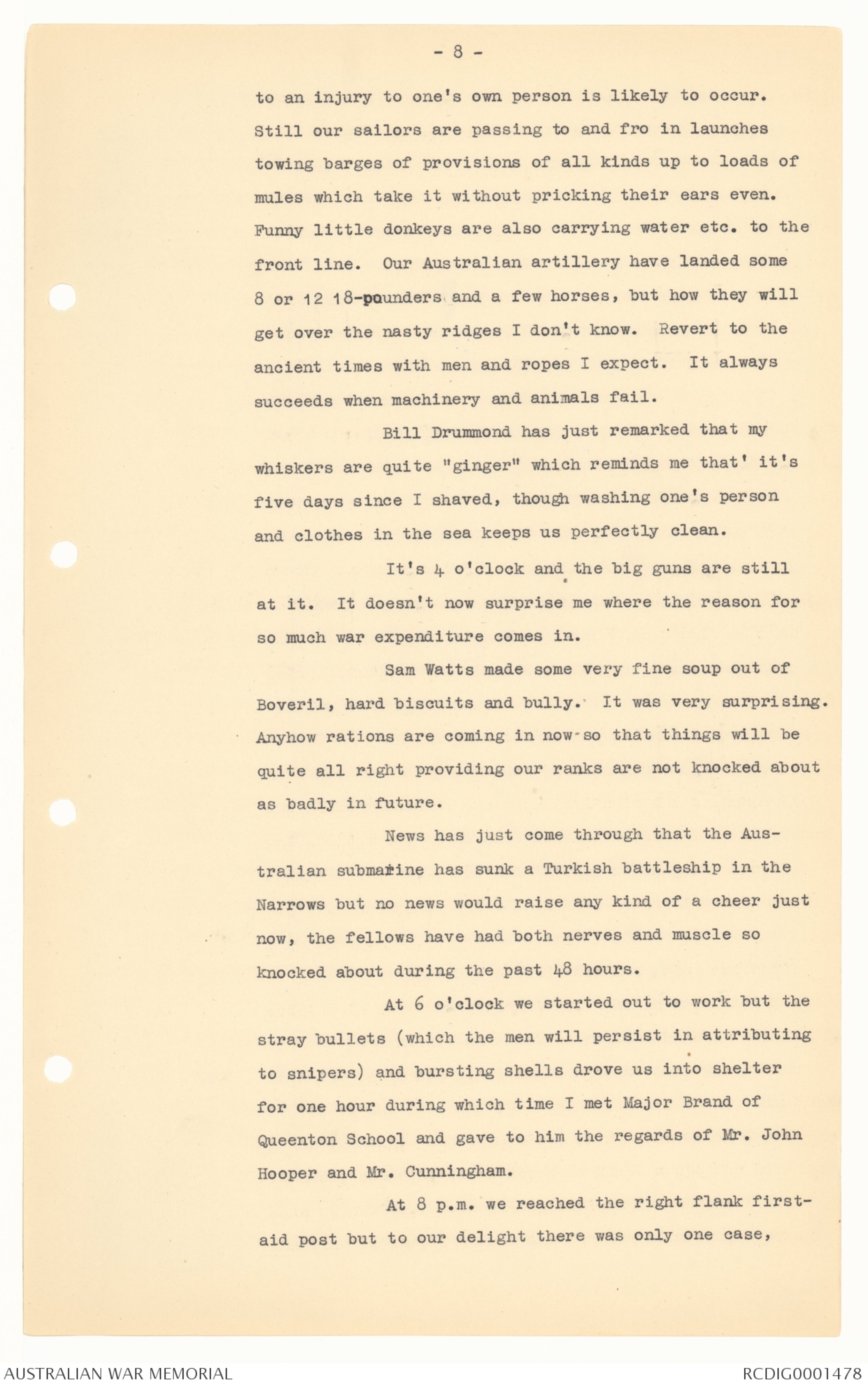
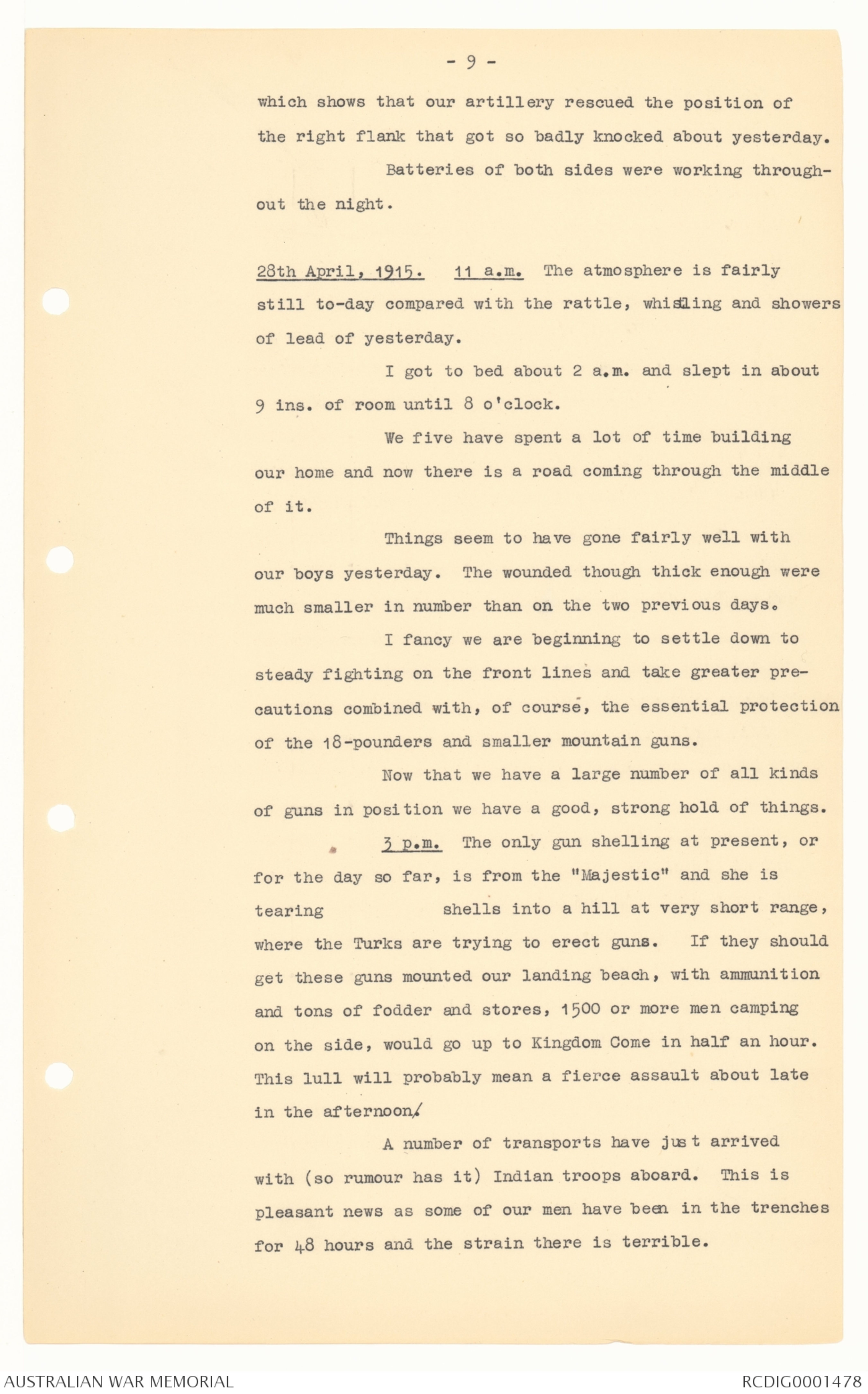
DIARY OF LIEUT. T.J. RICHARDS. M.C.
1st Battalion. A.I.F.
BOOK. 2.
25 April, 1915 - 26 January 1916.
Book No. 2.
25th April, 1915. No bugle call to wake us this
morning but most of us were astir before the sun
rose - a brilliant and pleasing red glow. It
was just the same as the sunset last night - a
stage setting with the flashes and booming of the
cannon to enliven matters. From just before
daylight as we approached Gallipoli, having left
Lemnos about 1 a.m., there was a wholesale roaring
and spitting of big guns, our warships being
particularly aggressive. The roar of guns did not
bother me much but as we were landing on to the
torpedo boat "Scourge" at 8.30 a.m. a shell came
just over No. 13 transport and stirred up the water
to a height of perhaps 60 feet, within 150 yards of
us. This brought home to me the grim reality of
war but to my surprise I was not much troubled and
took seven photos before landing up over our knees
in water from the rowing boats into which we were
transferred from the "Scourge." As we were landing
a shrapnel shell burst 150 yards away and threw a
shower of bullets into the water - rather a pretty
display! Twenty minutes later with stretchers we
were climbing the steep, rough hills looking for
wounded, but it was about 1 o'clock when I got my
first case and from then until 6 o’clock I had fully
twenty dressings to do. The wounded were in splendid
spirit and told me that in landing at 3 a.m. this day
the Turks were right down on the beach but were soon
driven back over the terrible ridges for a distance
of two miles, but alas! our fellows got knocked about
badly before this . Seeing that the Turks had been
- 2 -
pushed back and three guns taken it was surprising to
me to find only a few dead and wounded Turks, while
our officers and men were knocked about.
In a fairly well sheltered valley I waited
for an hour within a short distance of the attacking
party. The word was continually being sent back that
help was badly needed on the left flank. A whole
battalion of men were sent in but it was too late.
The Turks had brought about a successful counter-attack
and driven our men back, chiefly by the use of machine
guns and shells. Showers of these shell bullets were
falling all around our positions and it fairly made us
shake. Machine guns were being pushed forward by the
New Zealanders. They only just passed our little
party when a captain got a bullet through his calf and
and a lieutenant got a shattered forearm/. Both came
under my treatment. A fellow came along and asked me
to go up and fix up his pal whose foot was shot. With
a stretcher Watts and I went only 100 yards along the
valley. The bush was too thick and the water-worn
track so rough that we discarded the stretcher and
proceeded on all fours up to the firing trenches
upon which our fellows had been driven back. Here was
a poor devil with his heel and sole of foot blown away,
and although in great pain he was what might be
considered cheerful. I cut his boot off and dressed the
foot. Bleeding was then not heavy. Now the trouble
was to get him away with rifle fire pinging overhead
and through the bushes within a foot of us. This
safely done the way out was awful but my patient
skidded down the steep side on his hands and seat
while I went forward holding the limb. In the bottom
of the gorge I got him onto my back and made good
progress but as the foot started to bleed heavily
I had to put a ligature on to the artery at the thigh.
- 3 -
Fully two hours had passed before we got back to the
boats taking wounded aboard the transports, and he
bore up wonderfully well right throughout. In his belt
was a large sum of money which he said amounted to £100.
When we got back I was pretty well finished. It was a
hard job for me but truly terrible for the patient.
While he was waiting he got out a sovereign and made me
take it.
It was a remarkable day right enough and a
day in which it was easy to pick out the wasters, also
the brave men. I am delighted with our Australian
troops; the way they take the gruel is splendid.
At times there was a shortage of ammunition and
reinforcements were badly wanted but seeing they had landed
everything under shell fire I should say they did very
well.
The Turks seemed to do most damage with
their shrapnel shells, not so much damage perhaps as
fright, as really they are uncanny damned things.
Our warships kept up a steady fire throughout
the day but I fear they were missing their marks
badly.
It was heart-rending to hear the plaintiff,
and only too ominous call of "More ammunition wanted
on the left." What a doleful story these words really
unfold! Also the call for reinforcements that came
back from mouth to mouth told of dire troubles that
were being experienced on the other side of the hill.
"Reinforcements - hung up on the right!" What a
significant sentence, especially when uttered by
the parched lips of a wounded man. Reinforcements
were hurrying forward, sweating and panting, loaded
with their equipment and a box of ammunition between
two.
- 4 -
26th April, 1915. At the moment the warships seem to
have a monopoly of the firing, some six ships taking
part. The Turks are not replying at all. We will have
mountain guns in action to-day. Indians with a whole
line of mules are ashore and carrying guns and shells
up the most difficult slopes with these sure-footed
animals.
All last night the rifle fire was terrific.
I went up behing the firing line at 3 a.m. and the reports
and flashes were a bit thrilling to say the least of it.
I slept in a bit of a "dug out" ib the hill
that runs down almost to the shingle (pebble beach),
but it rained and the position/was too awkward to sleep
much.
9 a.m. Rifle fire is going on along our
front to the right of where I am sitting, camera at
my feet, and by reports of the terrific firing I should
say our men are beating off an attack. The warships are
shelling hell for leather while the Turks' shell fire
is at rare intervals, although they just landed one
amongst some engineers working about 200 yards from my
present position. The stretcher bearers are not going
along the shrapnel valley this morning. The Turks seem
to have covered it with snipers. The ships are perhaps
5 or 600 yards off the landing-place. The Queen
Elizabeth is down some distance on the right and adding
somewhat to the fury.
At 10 o'clock with three stretcher parties
we were dodging shrapnel for 1½ hours under the side
of the gorge. The rain of lead poured down incessantly
and as each whistler was heard overhead we ducked each
time. I am beginning to pick up the sounds of the
different guns and to know the bullet pellets.
This is indeed a wonderful experience,
and seeing there is so much slaughter and lead flying
- 5 -
about we all take it mighty coolly and joke all the
time that we are dodging.
Bully beef and biscuits for dinner with a
dixie of tea boiled over a pine case fire.
At 2 o'clock we, in stretcher parties, were
away out again and met the very despondent 3rd Brigade
going back into the firing line. Two companies out of
each battalion of this brigade comprised the landing
party on Sunday morning, and although they suffered
heavily I cannot yet understand how they came to effect
so successful a landing, or any landing at all, in the
very teeth of a machine gun in such small parties.
The mistake made seems to have been in following the
Turks 2½ miles back from the beach, which in this country
meant getting away from ammunition and all supports, so
that when the Turks stopped the 3rd Brigade got cut to
ribbons and were too far away to be assisted. This
happened on our left flank and I am of the opinion that
the same thing happened on the right flank yesterday
as we got a lot of wounded from there, and the cry going
along the communication lines was like a lost soul crying
"For goodness sake hurry along more men and ammunition
as we are losing ground like hell."
Later. Reports are very encouraging indeed
and make out that our left and right supports are making
wonderful progress capturing 1000 men and 9 guns but
around here we seem to be up against it all right and
have probably lost 1800 men for the two days.
Our Corps were working until 11 p.m. and were
out again at 1 a.m. gathering in the wounded most of whom
bear up with wonderful fortitude and patience.
Our fleet must have sent in 1500 shells
yesterday which quietened down the Turks' shrapnel fire
but to my surprise they showered in shell after shell
on to our battleships just before dark and continued
- 6 -
into the darkness making almost a fireworks display.
Through the night there was not as much rifle fire as
the previous night, yet there was a steady fire the
whole time and bullets whizzed near our party all the
time we were out.
27th April, 1915. I got to bed about 4 a.m. but woke
at daybreak after 2½ hours sleep - good sound sleep too -
as this carrying work is very hard going. The big
guns - chiefly the Turks' - prevented any hope of
further sleep.
It is now 9 a.m. and I expect 40 tons of lead
has passed overhead going both ways, already, as I lie
in the dug-out balcony bedroom. We are told to sleep
now as we will be out all night in the moonlight.
The Turkish shells are giving our ships that
lie in front of the landing stage a very rough time.
It is reported that 18,000 Turkish reinforcements
were brought up last night. I fancy our "front"
is feeling it just at this moment as men are being
gathered from all over the hillside camping and resting
ground and being hustled away forward to the line of
front which extends over a length, as far as I know, of
3½ miles, of which the country is somewhat like the
ravines in the Blue Mountains only they are covered
with low thick bush and a natural hiding place. I feel
sure that our fellows are doing splendidly against a
force that I'm sure must outnumber us by 6 to 1.
Our 14 or 20 transports have been compelled
to move out further to avoid the shells. This morning
is the first time that the enemy's guns have been able
to reach the transports. This looks as if they have
moved in closer to us during the night. Yesterday we
had several Indian-manned mountain guns in action and
they seemed to hold back the opposition fire. It is
- 7 -
grand to watch these Indians at work. They are so quick
with their guns and remarkably cool. We have some number
of mules taking shells and tins of water over the hills
handled also by Indians, and bullets never make them
flinch in the slightest.
There was a great artillery duel going on
this morning and I reckon there will be some number of
wounded to-day also. The rifle fire sounds thick in
behind us. What we will do to hold the enemy without
fresh reinforcements I cannot see as the disabled list
reads something like 1700 on Sunday and well over 600
yesterday which is making a hole in such a handful of
men.
It has turned 2 p.m. and I am still lying
on the verandah watching the marvelous spectacle of an
artillery duel which at the moment is raging more fiercely
than at any time to-day and by the huge spouts of water
being knocked up at times I should say the Turks have
brought up larger guns.
News that the French and British troops
have met over on the Dardanelles is good news indeed
and might mean that our poor devils in the trenches will
get assistance, as it must be a perfect hell on the front
a day like this. Shrapnel is such strange and mystic
stuff to our men; they don't like it and it makes them
very shaky.
The Army Medical are not going out until
evening in the strong moonlight. Shells are falling at
perhaps 40 a minute and must be getting home on the fleet,
sweeping their decks. A small mine-sweeper was sunk a
little to the left and 100 yards from the shore, about 200
yards from us. The improvised wharf from which our
wounded, chiefly, leave has been shell swept for half an
hour at a time. It's all so strikingly wonderful and
exciting as anything from the sinking of a dreadnought
- 8 -
to an injury to one's own person is likely to occur.
Still our sailors are passing to and fro in launches
towing barges of provisions of all kinds up to loads of
mules which take it without pricking their ears even.
Funny little donkeys are also carrying water etc. to the
front line. Our Australian artillery have landed some
8 or 12 18-pounders and a few horses, but how they will
get over the nasty ridges I don't know. Revert to the
ancient times with men and ropes I expect. It always
succeeds when machinery and animals fail.
Bill Drummond has just remarked that my
whiskers are quite "ginger" which reminds me that' it's
five days since I shaved, though washing one's person
and clothes in the sea keeps us perfectly clean.
It's 4 o'clock and the big guns are still
at it. It doesn't now surprise me where the reason for
so much war expenditure comes in.
Sam Watts made some very fine soup out of
Boveril, hard biscuits and bully. It was very surprising.
Anyhow rations are coming in now so that things will be
quite all right providing our ranks are not knocked about
as badly in future.
News has just come through that the
Australian submarine has sunk a Turkish battleship in the
Narrows but no news would raise any kind of a cheer just
now, the fellows have had both nerves and muscle so
knocked about during the past 48 hours.
At 6 o'clock we started out to work but the
stray bullets (which the men will persist in attributing
to snipers) and bursting shells drove us into shelter
for one hour during which time I met Major Brand of
Queenton School and gave to him the regards of Mr. John
Hooper and Mr. Cunningham.
At 8 p.m. we reached the right flank first-aid
post but to our delight there was only one case,
- 9 -
which shows that our artillery rescued the position of
the right flank that got so badly knocked about yesterday.
Batteries of both sides were working
throughout the night.
28th April. 1915. 11a.m. The atmosphere is fairly
still to-day compared with the rattle, whistling and showers
of lead of yesterday.
I got to bed about 2 a.m. and slept in about
9 ins. of room until 8 o'clock.
We five have spent a lot of time building
our home and now there is a road coming through the middle
of it.
Things seem to have gone fairly well with
our boys yesterday. The wounded though thick enough were
much smaller in number than on the two previous days.
I fancy we are beginning to settle down to
steady fighting on the front lines and take greater
precautions combined with, of course, the essential protection
of the 18-pounders and smaller mountain guns.
Now that we have a large number of all kinds
of guns in position we have a good, strong hold of things.
3 p.m. The only gun shelling at present, or
for the day so far, is from the "Majestic" and she is
tearing shells into a hill at very short range,
where the Turks are trying to erect guns. If they should
get these guns mounted our landing beach, with ammunition
and tons of fodder and stores, 1500 or more men camping
on the side, would go up to Kingdom Come in half an hour.
This lull will probably mean a fierce assault about late
in the afternoon/.
A number of transports have just arrived
with (so rumour has it) Indian troops aboard. This is
pleasant news as some of our men have been in the trenches
for 48 hours and the strain there is terrible.
 Jasmine Hatharasinghe
Jasmine HatharasingheThis transcription item is now locked to you for editing. To release the lock either Save your changes or Cancel.
This lock will be automatically released after 60 minutes of inactivity.